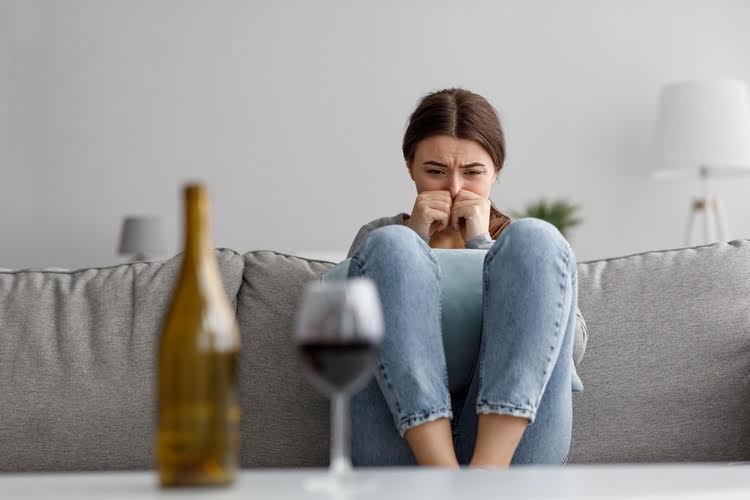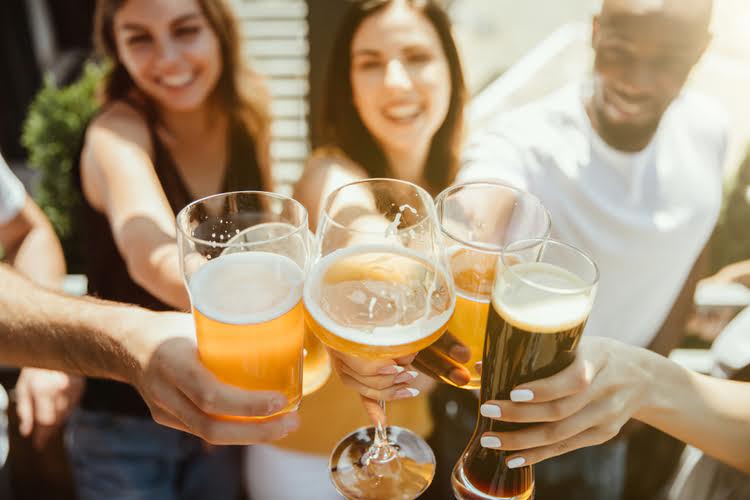We used structured questionnaires, including Alcohol Use https://ecosoberhouse.com/ Disorder Identification Test-Korean revised version (AUDIT-KR) and the Pittsburgh Sleep Quality Index-Korean version (PSQI-K). We analyzed the association between scores for all subcategories of the PSQI-K and the AUDIT-KR and then analyzed the correlation between AUDIT-KR and global PSQI-K scores. First, alcohol affects everyone differently because of a slew of factors, like age, biological sex, and body composition, just to name a few.
0 Acute effects of alcohol on sleep
P2 amplitude was,however, smaller in alcoholics than controls with the difference being largest at Cz,where the component was maximal, but smaller at other sites (see Figure 5). There were no sexdifferences or interactions between diagnosis and sex for K-complex incidence, P2amplitude or P2 latency. Frontal (but not posterior) N550 and P900 does alcohol make you sleep longer amplitudes were smallerin alcoholics than controls and smaller in men than women, but the sex difference was notrelated to diagnosis. Latencies of N550 and P900 did not differ as a function of diagnosisor sex. This isn’t just applicable to large quantities of alcohol, the consumption of relatively small amounts of alcohol can interfere with your body’s natural sleep patterns. The link between alcohol consumption and sleep impairment is especially prominent among older adults.
Healthy Bedtime Snacks to Eat Before Sleep
In particular, we learned that alcohol consumption patterns are related to subjective sleep quality, sleep duration, and sleep continuation. In contrast, sleep latency was not correlated with alcohol consumption level. Among factors that disturb sleep, it was learned that snoring, in particular, is linked with alcohol consumption. Proceed with caution when drinking before bedtime, as alcohol may be affecting your sleep more than you realize. This may be especially true if you drink alcohol to help you fall asleep faster, and then experience disrupted sleep later in the night without realizing it. Since even small amounts of alcohol can affect your sleep, the overwhelming consensus in the medical community is that alcohol is not an appropriate sleep aid.
The effects of alcohol on sleep quality and overall nutrition are far from beneficial. This article delves into the intricate interplay between alcohol consumption and sleep patterns, exploring how alcohol might be impacting your sleep more than you realize. These disruptions to REM sleep are even seen after drinking low doses of alcohol (around two standard drinks) within three hours of bedtime. “Even if alcohol initially helps someone fall asleep, they may wake up many times throughout the night or not get into a deep sleep,” she continues.
We all know someone who feels merry following their first drink and we know others who appear unfazed by pint after pint. Too many pints — or that extra glass of wine — can be the trigger for waking up bathed in sweat with your pillow soaking wet. Alcohol will undoubtedly help to send you off to sleep as it actually works on the same receptors in the brain that are targeted by some sleeping tablets. A questionnaire-based cross-sectional survey was conducted with 234 men and 159 women who had visited a general hospital.
How Much Is Too Much Alcohol Before Bed

Research shows that alcohol actually has a disruptive effect on your sleep the rest of the night and messes with sleep quality and quantity. So while, yes, that glass of wine can enhance your sleep on occasion, remember that it’s certainly not a long-term solution to ongoing sleep troubles and can, in fact, exacerbate the issue. Before reaching for that glass, hear from the experts how alcohol before bed might affect your sleep. The impact of alcohol on your sleep can run over to the next day in the form of grogginess and a low mood— leading to the commonly known feeling of being “hungover.” “Alcohol is also linked with more intense dreams and nightmares, disrupting sleep, and may lead to sleep paralysis by breaking REM sleep cycles,” says Dr. Daidone.

Plenty of research suggests that the initial sedative effect of alcohol will wane as its levels in the blood decrease. This means that there may be a reduction in sleep onset latency (the time it takes to fall asleep) but you’ll run the risk of disruption to you sleep later in the night. While alcohol may make you fall asleep faster, the quality of your rest is significantly compromised, which is why quitting drinking often leads to better sleep. If alcohol continues to disrupt your overall sleep quality, you marijuana addiction may consider cutting it out entirely, or limiting your intake before bedtime.
- They can rule out any underlying cause for your insomnia and recommend the best treatment for you.
- For example, people with moderate or severe anxiety who use alcohol in hopes of sleeping better are actually more likely to have sleep problems.
- Peters is a board-certified neurologist and sleep medicine specialist and is a fellow of the American Academy of Sleep Medicine.
- Your liver processes roughly one standard drink per hour, so if you go to bed while your blood alcohol level is still rising or peaking, your brain’s sleep cycle will get disrupted.
- This may be especially true if you drink alcohol to help you fall asleep faster, and then experience disrupted sleep later in the night without realizing it.
Sleep Stages
- People who wake up tired every morning may be more likely to lean back in to drinking to help them sleep better.
- ‘Bottoms up’ is simply not a long-term recipe for restful sleep – instead, the bottom line is that although there may be a perceived sense that alcohol promotes faster and deeper sleep, it’s in fact just a ruse.
Light sleep tends to be more prevalent in the first few hours after hitting the sheets. That’s followed by a deeper cycle of snoozing known as rapid eye movement (REM) sleep. During the final hours of sleep when alcohol is metabolized by the body, it can have a disruptive effect on sleep, causing frequent waking and fragmented sleep. Ultimately, alcohol can decrease the amount and quality of sleep you get. Eating vitamin B-rich foods like salmon, brings down inflammation, bananas restore potassium levels, ginger treats nausea and evidence shows that natural sugars in fruit, move the alcohol out of your system more quickly. If you’re using alcohol to fall asleep, you might want to see a sleep doctor.
But “safe” levels can differ widely based on individual health, age, and other factors. Even moderate amounts can still disrupt sleep if consumed too close to bedtime. Drinking to fall asleep can cause or worsen some health issues over time. These include breathing issues like sleep apnea, which is linked to drinking. If you find that you persistently snore whether you’ve been drinking or not, it could be due to a sleep disorder, such as sleep apnea.
- If you drink alcohol before bed, you – or a partner – may notice snoring.
- It ispossible that increased REM sleep may represent a predisposition to altered sleep ratherthan a consequence of alcohol abuse; although REM is not elevated in adolescents with apositive family history of alcoholism (Tarokh et al.2012).
- Finally, going to bed with alcohol in your system increases your chances of having vivid dreams or nightmares, or sleepwalking and other parasomnias.
- However as the body processes the alcohol during the later sleep stages, the quality of sleep is affected and the sleep architecture is changed.
- The site connects with consumers to provide them with personalized content that reduces their stress, makes them laugh, and ultimately feel more confident and capable on their healthcare journey.
First, alcohol increases the action of a chemical messenger in the brain called GABA. This has a sedative effect, thought to contribute to the sleepy feeling many people experience when drinking alcohol. Alcohol may also increase levels of adenosine, a chemical messenger that is important for sleepiness. “Typically, it’s advised to stop drinking alcohol around three to four hours before bed. This should give the body enough time to metabolize the alcohol and get it out of one’s system, allowing them to enjoy unaffected sleep,” explains Dr. Hsu.

Alcohol just before sleep can therefore lead to decreased sleep onset latency – that is, it can make you fall asleep faster. However as the body processes the alcohol during the later sleep stages, the quality of sleep is affected and the sleep architecture is changed. More than 70% of those with alcohol use disorder (AUD) also experience alcohol-induced sleep disorders, such as insomnia, according to scientists in a 2020 review. Regular drinking has also been linked to shorter periods of rapid eye movement (REM) sleep, a disrupted circadian rhythm, and snoring. This form of REM rebound cannot explain theincreased REM in those who have been abstinent for a long time, relative to controls. It ispossible that increased REM sleep may represent a predisposition to altered sleep ratherthan a consequence of alcohol abuse; although REM is not elevated in adolescents with apositive family history of alcoholism (Tarokh et al.2012).
Tinggalkan Balasan